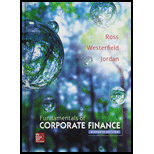
Concept explainers
A firm has paid dividends of $1.02, $1.10, $1.25, and $1.35 over the past 4 years, respectively. What is the average
To determine: The dividend growth rate.
Introduction:
Dividend refers to the return on the equity capital. Dividend growth rate refers to the rate at which the dividend grew for a certain period.
Answer to Problem 14.2CTF
The “average dividend growth rate” is 9.83 percent.
Explanation of Solution
Given information:
A firm paid dividends amounting to $1.02 in Year 1, $1.10 in Year 2, $1.25 in Year 3, and $1.35 in Year 4.
The formula to compute the percentage change in dividend each year:
The formula to calculate the “average dividend growth rate”:
Compute the percentage change in dividend for Year 2:
Hence, the percentage change in dividend for Year 2 is 7.84 percent.
Compute the percentage change in dividend for Year 3:
Hence, the percentage change in dividend for Year 3 is 13.64 percent.
Compute the percentage change in dividend for Year 4:
Hence, the percentage change in dividend for Year 4 is 8 percent.
Compute the “average dividend growth rate”:
Hence, the “average dividend growth rate” is 9.83 percent.
Want to see more full solutions like this?
Chapter 14 Solutions
Fundamentals of Corporate Finance with Connect Access Card
- No Chatgpt 2. Which of the following is a short-term source of finance? a) Bondsb) Equity sharesc) Trade creditd) Debenturesarrow_forward2. Which of the following is a short-term source of finance? a) Bondsb) Equity sharesc) Trade creditd) Debenturesno aiarrow_forward2. Which of the following is a short-term source of finance? a) Bondsb) Equity sharesc) Trade creditd) Debenturesarrow_forward
- Which of the following best describes the concept of leverage in finance? A) Using borrowed funds to increase the potential return on investment B) Reducing risk by diversifying assets C) A method to avoid paying taxes D) Increasing the company’s profit margin no aiarrow_forwardWhat does a ledger account represent? A) A detailed record of all business transactionsB) A summary of trial balancesC) An individual record for each accountD) The final balance of a financial statementarrow_forwardWhich of the following is a capital budgeting technique used to evaluate an investment project? A) Net Present Value (NPV) B) Return on Assets (ROA) C) Price-to-Earnings Ratio (P/E) D) Dividend Yield No aiarrow_forward
- What does the term 'liquidity' refer to in finance? A) The ability to quickly convert an asset into cash B) The total value of a company’s assets C) The volatility of a market D) The difference between liabilities and assets no aiarrow_forwardWhich of the following is a characteristic of a high-risk investment? A) Low returns B) Stable performance C) Potential for high returns with greater uncertainty D) Guaranteed returnsarrow_forwardWhat does the term 'liquidity' refer to in finance? A) The ability to quickly convert an asset into cash B) The total value of a company’s assets C) The volatility of a market D) The difference between liabilities and assets need help.arrow_forward
- I need help in this question now! What does a company’s price-to-earnings (P/E) ratio indicate? A) The return on investment for shareholders B) The company’s profitability relative to its stock price C) The company’s debt relative to its equity D) The company’s dividend payout ratioarrow_forwardI need answer quickly What does a company’s price-to-earnings (P/E) ratio indicate? A) The return on investment for shareholders B) The company’s profitability relative to its stock price C) The company’s debt relative to its equity D) The company’s dividend payout ratioarrow_forwardThe term 'beta' in stock market analysis measures: A) The total value of a company’s stocks B) A stock’s sensitivity to the overall market C) The dividend yield of a stock D) A stock’s price-to-earnings ratio i need help in this question!arrow_forward
 Essentials Of InvestmentsFinanceISBN:9781260013924Author:Bodie, Zvi, Kane, Alex, MARCUS, Alan J.Publisher:Mcgraw-hill Education,
Essentials Of InvestmentsFinanceISBN:9781260013924Author:Bodie, Zvi, Kane, Alex, MARCUS, Alan J.Publisher:Mcgraw-hill Education,

 Foundations Of FinanceFinanceISBN:9780134897264Author:KEOWN, Arthur J., Martin, John D., PETTY, J. WilliamPublisher:Pearson,
Foundations Of FinanceFinanceISBN:9780134897264Author:KEOWN, Arthur J., Martin, John D., PETTY, J. WilliamPublisher:Pearson, Fundamentals of Financial Management (MindTap Cou...FinanceISBN:9781337395250Author:Eugene F. Brigham, Joel F. HoustonPublisher:Cengage Learning
Fundamentals of Financial Management (MindTap Cou...FinanceISBN:9781337395250Author:Eugene F. Brigham, Joel F. HoustonPublisher:Cengage Learning Corporate Finance (The Mcgraw-hill/Irwin Series i...FinanceISBN:9780077861759Author:Stephen A. Ross Franco Modigliani Professor of Financial Economics Professor, Randolph W Westerfield Robert R. Dockson Deans Chair in Bus. Admin., Jeffrey Jaffe, Bradford D Jordan ProfessorPublisher:McGraw-Hill Education
Corporate Finance (The Mcgraw-hill/Irwin Series i...FinanceISBN:9780077861759Author:Stephen A. Ross Franco Modigliani Professor of Financial Economics Professor, Randolph W Westerfield Robert R. Dockson Deans Chair in Bus. Admin., Jeffrey Jaffe, Bradford D Jordan ProfessorPublisher:McGraw-Hill Education





